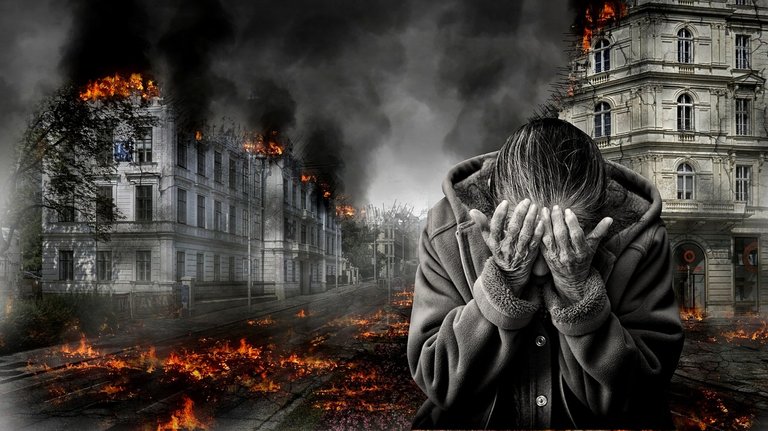The Man Who Saved the World
"I do not know with what weapons World War III will be fought, but World War IV will be fought with sticks and stones!"
Albert Einstein
Only 14 minutes had elapsed after midnight of that rising September 26, 1983, when the sound of an alarm interrupted the silence that reigned in the room of Serpukhov-15, an underground bunker located on the outskirts of Moscow, capital of the now extinct Union of Soviet Socialist Republics, where Russian aerospace defense was coordinated.
The atmosphere between the two superpowers at that time was tense. Just a few weeks ago, the Soviet air force had shot down a South Korean commercial aircraft that "allegedly" would have violated its airspace, causing the loss of 269 innocent lives among passengers and crew. including US Congressman for the state of Georgia Larry McDonald. This confusing incident brought with it a strong wave of protests worldwide, where then-President Ronald Reagan called it the "Korean Airline Massacre", a "crime against humanity [that] should never be forgotten" and an "act of barbarism ... [of] inhuman and cowardly brutality." Subsequently, the member countries of NATO (North Atlantic Treaty Organization) would coordinate actions to carry out joint military exercises, while the Soviet intelligence agency, the infamous KGB would inform its spies in the West of the imminence of a "nuclear attack".
The officer on duty in the bunker, a lieutenant colonel who was in charge of a team of specialized technicians and military personnel who monitored, day and night, the early warning network for any possible attack by enemy nuclear missiles, was paralyzed by the great red screen where the word "launch" was read, which would indicate that a long-range missile would have been launched from a US military base located in Montana and would hit Russian territory within 20 minutes.
The officer knew the procedure by heart: he had to report within a period of no more than 15 minutes to his superiors, who would ultimately be responsible for initiating or not initiating a massive retaliatory attack. However, he had serious doubts about the reliability of the Russian detection system. A few minutes would have passed, when the alarm was activated again, later a third, a fourth and even a fifth time would be activated. Computers switched from "launch" alerts to "missile attack"; a cold sweat ran through his body from head to toe while the rest of those present did not dare to utter a word, waiting for his decision.
A question would assail the lieutenant colonel, why would the Americans risk initiating a nuclear attack with only 5 missiles? Knowing that the response of the Soviets would be of greater proportions, his intuition told him that this was completely absurd and lacking of logic. He was perfectly aware that a mistake could give rise to the nuclear holocaust, the much feared Armageddon, the biblical battle of the "End of Times" between the forces of good and evil that would put an end to humanity, or at the very least, it would end life as we understand it and know it today.
Time seemed to have stopped, the minutes lengthened and the air in the bunker became unbreathable, when suddenly the alarms ceased. No reports were received that any enemy missile had hit Soviet soil. The officer would then call the officer on duty at the Soviet Army headquarters, where he would report a system failure.
Years later, the lieutenant colonel would point out in an interview that "In this situation, I decided that maybe it would be my mistake, but I did not want to start World War III."

The Man Who Saved the World
Stanislav Yevgráfovich Petrov was born on September 7, 1939 near Vladivostok, and died on May 19, 2017 in Friázino, a suburb of Moscow.
Son of a war pilot during World War II and a nurse. He would study at a technical university of the Soviet Air Force in Kiev, later joining the Air Defense Forces, where he would climb positions. In the early 1970s he was assigned to the early warning system.

Petrov was the duty officer who would correctly identify a missile attack alert as a false alarm that early morning in September 1983, avoiding what could have triggered a nuclear war between the superpowers of that time, the former Soviet Union and the United States.
Although he was initially praised for the calm he demonstrated during the development of the event that would later become known as the Autumn Equinox Incident, the Soviet military high command, embarrassed by the failure in the system that showed its inefficiency and vulnerability, chose to verbally reprimand him for "inadequate presentation of documents." He was relieved of his position and it was decided to hide the event until it would come to light in 1998, in an interview granted by the superintendent of Petrov, Colonel Yury Votintsev to the German newspaper Bild, in which he referred to his feat.
He would retire from the armed forces in 1984, after which he would obtain a job as a senior engineer in the research institute that coincidentally would have developed the early detection system, which would have failed when the satellite that activated the alarm, confused the reflection of the sun in the clouds with a missile launch. Later he retired to dedicate himself to the care of his wife Raisa who was a victim of cancer and who died in 1997, after which he would live on the income he would obtain from his pension.
After becoming known for that incident, Stalisnav Petrov was awarded in 2004 the World Citizen Award of the Association of World Citizens, which consisted of a trophy and US $ 1,000, to avoid what could have been a global disaster. In January 2006, he would travel to the United States, where he would be honored by the United Nations, and where he was awarded a second prize from the Association of World Citizens.
The Australian Senate would award him on June 23, 2004. In Germany, he would be awarded the German Media Award in 2011, which recognizes those who have made significant contributions to World Peace. He would also be awarded the 2013 Peace Prize from Dresden.
In 2014, the American actor and film director Kevin Costner would make the documentary The Man Who Saved The World where Petrov who never considered himself a hero, would relate:
"Everything that happened didn't concern me - it was my job. I was just doing my job and I was the right person at the right time, that's all. My last wife didn't know anything about it for ten years. 'But what did you do ?', she asked me. "I did nothing"

Lieutenant Colonel Petrov died at 77 years of age in Friázino, a Moscow suburb, where he lived alone. The news of his death would hardly have an echo in the Russian media. However, the citizens of the world owe our lives to this man who was "at the right time.

Source
Bibliographical Sources:
- Stanislav Petrov
- El hombre que salvó el mundo
- El 26 de Septiembre de 1983: Stanislav Petrov evitó la Tercera Guerra Mundial
- El adiós del hombre que salvó al mundo
- Stanislav Petrov: "El hombre que salvó al mundo"





twitter link: #posh
https://twitter.com/manuelgil64/status/1302017997985415173?s=19
Gracias por compartir tu contenido con la comunidad de El Arca (@elarca), el mismo ha sido votado por nuestra iniciativa de curación artística @stellae. Si deseas puedes delegar HP al proyecto: Delegate 25 HP Delegate 50 HP Delegate 100 HP Delegate 250HP Delegate 500HP
Thank you for sharing the story of Lieutenant Colonel who made the right decision and prevented a mistake from starting the end of the world as we know it.